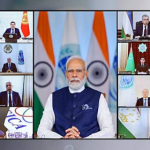Founded in 2001 as a regional bulwark of security and economic cooperation, the Shanghai Cooperation Organisation (SCO) is easily the most-influential multilateral grouping of the Eurasian region, representing 42% of the global population and about one-third of the world’s Gross Domestic Product (GDP). It may appear to be an odd mix of nations – rivals and adversaries, neglected states and regions, the ambitious and the quiet, suppliers and consumers – with seemingly little in common. But what it says and does is imbued with considerable significance, especially as India has held the presidency since September 2022.
As the host of the 23rd meeting of SCO’s Council of Heads of State, held in a virtual format this week, the Indian government seems content with the summit’s outcomes – and New Delhi’s role in shaping them. This is probably because Indian officials are relieved that the event passed off without any major incident or acrimonious exchanges of the kind that marked the SCO foreign ministers’ meeting in Goa in May. The sharp parley then between India and Pakistan focussed mainly on the issues of cross-border terrorism and Jammu and Kashmir. That could have played into New Delhi’s decision to convene the summit virtually for, as external affairs minister S Jaishankar explained, it depended on “who is coming and what India’s situation is.” Add to that lingering uncertainty about the participation of Russian and Chinese leaders and the lack of enthusiasm to receive the prime minister of Pakistan in Delhi.
A critical look at the outcomes reveals a measure of progress. The Delhi Declaration has several noteworthy features: reiteration of SCO’s commitment to counter the triple challenges of terrorism, separatism and extremism; the assertion that SCO member States are not against other nations, thereby attempting to change the perception that the grouping is anti-western in its orientation; and a clear affirmation that Central Asia is the core of SCO, and, therefore, the Central Asian states merit the full benefit of the grouping’s multidimensional activities, ranging from security collaboration to economic cooperation. The summit approved two thematic joint statements on cooperation in countering radicalisation and promoting digital transformation.
Perhaps the most interesting aspect is SCO’s continuing expansion. This grouping began as the Shanghai Five – China, Kazakhstan, Kyrgyzstan, Russia and Tajikistan – in 1996, and became SCO in 2001 with the inclusion of Uzbekistan.
India and Pakistan were admitted in 2017. Iran was inducted at the latest summit. Belarus will be the 10th member soon. SCO has two observers (Mongolia and Afghanistan) and 14 dialogue partners – many of whom are pushing for SCO membership. This interest shows that despite internal contradictions, SCO is here to stay and might even grow in importance.
But all is not well with SCO. While combating terrorism is an essential ingredient of its charter, its position is marred by hypocrisy. The organisation repeatedly swears an anti-terrorist stance but is unwilling to take a stand on Pakistan’s nefarious record in this domain. This compelled Prime Minister Narendra Modi to call out “some countries” who use cross-border terrorism as an instrument of their policies. “SCO should not hesitate to criticise such nations,” he stressed. Unfortunately, such dual speak is unlikely to end soon.
Worse still are SCO’s internal differences and contradictions. Central Asia is suspicious of both its big neighbours, Russia and China, even as their security and economic assistance cannot be jettisoned. The strong China-Russia partnership can hardly conceal their differing interests within the grouping. The grouping is so divided on Ukraine that the issue did not figure in the joint declaration. India’s strained ties with China and Pakistan are a stumbling block.
Some of the questions PM Modi raised at the summit showed India’s preference on the plurilateral’s future. India would like SCO to evolve into an organisation that is fully equipped to tackle modern-day challenges. India wants SCO to adopt English as a working language, in addition to Russian and Chinese. Alas, this found no mention in the Delhi Declaration, indicating the difficulties of wrangling such a diverse grouping. Foreign secretary Vinay Kwatra later observed that this work was “ongoing.”
New Delhi put in a special effort to make its presidency proactive, despite running the G20 Presidency year in parallel. It hosted 134 events, including 15 ministerial meetings. India’s SCO presidency concentrated on five pillars: startups and innovation, traditional medicine, youth development, digital inclusion and shared Buddhist heritage. It initiated two new mechanisms: A special working group on startups and an expert-level working group on traditional medicine. India remains a strong champion of expanding connectivity among SCO countries but is opposed to China’s Belt and Road Initiative as a matter of principle. Iran’s entry as the newest member may give India’s connectivity efforts a fillip.
Despite this, what other major nations do in SCO may take centrestage. President Vladimir Putin used the summit to criticise the West over its approach to the Ukraine conflict and its unilateral sanctions against Moscow. He thanked SCO leaders for extending support, in the context of the recent armed rebellion. President Xi Jinping said that SCO grew stronger in recent years. While referring to its development opportunities and risks, he quoted “the great Indian poet” Rabindranath Tagore as saying, “The sea of danger, doubt and denial around man’s little island of certainty challenges him to dare the unknown.” Unfortunately, the Chinese President failed to exercise Gurudev’s grace and compliment India for a successful presidency and substantial contribution to an organisation that faces an uncertain future, and wants to dare the unknown.
Ambassador Rajiv Bhatia is Distinguished Fellow, Foreign Policy Studies, Gateway House and a former ambassador.
This article was first published in Hindustan Times.


